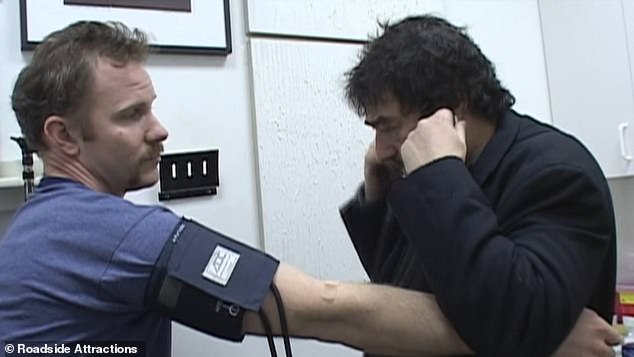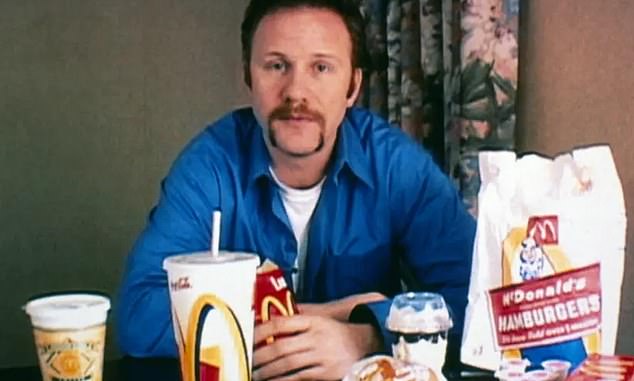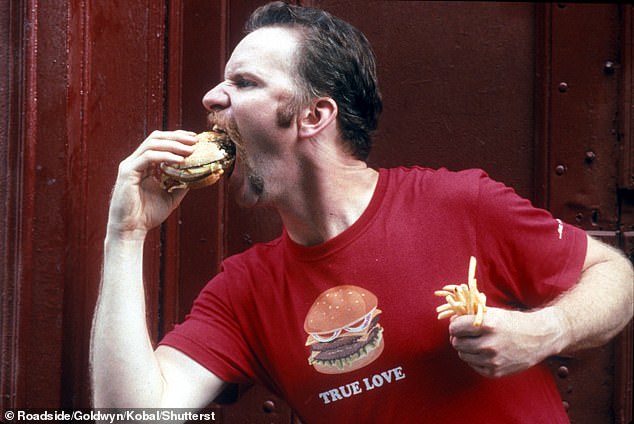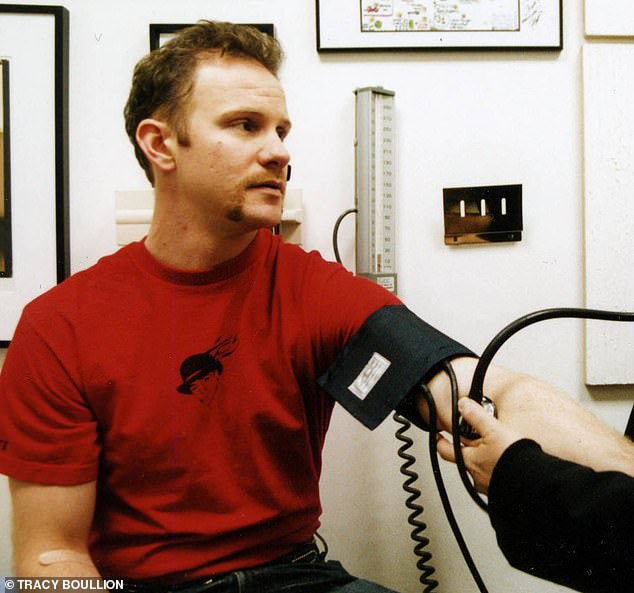Horrifying effects of eating McDonald’s for a month on Morgan Spurlock’s body revealed – including ‘turning his liver to paté’
The death of Morgan Spurlock – the man behind the 2004 fast food show Super Size Me – from cancer at the age of 53 has brought his health experiment back into sharp focus.
There is no evidence that his stunt from 20 years ago, in which he ate nothing but McDonald’s food for a month, is related to his death.
But the experiment took a major toll on his body at the time, causing his cholesterol levels and body fat to skyrocket and his “liver to turn to pate,” as his doctor put it.
His health transformation was so shocking that McDonald’s eliminated its super-sized menu options — and it was a turning point in the way many Americans viewed fast food.
But years later it emerged that Spurlock struggled with alcoholism during filming, which may have affected the results.
His physical and mental health deteriorated rapidly and by the end of the experiment he had gained 24.5 pounds

On day two of his experiment, Mr. Spurlock felt so nauseous that he vomited outside his car window
In the documentary, the doctor who examined him during the experiment said that the fast food was “pickling his liver” and that it resembled an “alcoholic after a binge” – but Spurlock neglected to mention his alcoholism.
It wasn’t until 2017 that Spurlock made the stunning admission that he had been “drinking consistently since he was 13.”
He added, “I haven’t been sober in over a week in 30 years.”
It led many to wonder if this was really the reason his liver looked like that of an alcoholic in the 2004 documentary, and if the tremors he got in the film were symptoms of alcohol withdrawal.
Spurlock’s 2017 confession also contradicts what he said in Super Size Me.
When the doctor initially asked, “Have you consumed alcohol?”, Spurlock replies, “Now?” No’.
At the start of the experiment, Spurlock weighed 185 pounds with a body mass index (BMI) of 23.2, which is considered healthy.

His doctor told him that his liver was failing and had become mushy like pate. He also gained about 10 pounds a week and his cholesterol soared
After just a few days of consuming only fast food, Spurlock began experiencing negative health effects.
He gained significant weight and his BMI increased to 25.5, which is considered overweight.
By the end of the experiment, he had gained 24.5 pounds and his BMI had risen to 30, or obese.
His cholesterol also rose from a healthy level to 230 mg/dl (6.0 mmol/l), which is considered a ‘borderline high risk’ of cardiovascular disease, stroke and other heart problems.
It suggested that fatty deposits had built up in his arteries, restricting blood flow to his heart.
A growing number of studies have also found strong links between high levels of refined sugars, saturated fats and processed ingredients and depression, something Spurlock struggled with during the documentary.
The blood sugar spike the food causes can later lead to fatigue, making a person less likely to participate in activities such as socializing that can prevent depression.

The rules of the experiment were to eat everything on the menu at least once a month and always have to answer “yes” to the question, “Do you want that Super Size?”

By the end of the experiment, Mr. Spurlock had gained about 25 pounds. His BMI rose from 23.5 to 30, putting him clearly in the obese category
a Study from 2014 in Iran found that among 13,486 participants, a significant association was found between junk food consumption and psychiatric problems. Most violent behaviors were also significantly associated with junk food intake.
Mr Spurlock’s sex drive also suffered. High levels of sugars and saturated fats restrict blood flow, making it difficult to perform in the bedroom.
About halfway through, Spurlock’s girlfriend, a vegan chef, tells the audience that he’s “having a hard time getting up.”
And eating these foods also leads to weight gain. Heart problems and high cholesterol can also cause erectile dysfunction, while trans fats are known to reduce libido
Just one day after starting the experiment, he vomited profusely. Shortly afterwards he noticed strange pulsations in his stomach.
When his doctor told him that his liver was becoming soft and mushy and told him that his liver was “turning into pate,” he meant that the food was altering the functioning of his liver to the point where it would no longer be able to detoxify blood and absorb nutrients. metabolize. and produce essential proteins.
The rules of the experiment were to eat everything on the menu at least once a month and always have to answer “yes” to the question, “Do you want that Super Size?”
“SGOT was originally 21,” the doctor said, meaning the liver began to function normally.
He added: Now it’s 130. And SGPT was originally 20.
“Now it’s 290, a more than tenfold increase… Anyone would now say you’re sick.”
He added: ‘If someone did this to their liver with alcohol, they could theoretically wipe out the entire liver… Wipe out their liver cells and, and, and they would have liver failure.
“I’ve never heard of anyone doing this to their liver on a high-fat diet, but I guess anything is possible.”
This indicates that the liver has been seriously damaged by toxins in the food.
His diet put him at higher risk for heart disease because of its effects on his inflammation levels and from blood flow disruptions caused by high cholesterol.
![Horrifying effects of eating McDonald's for a month on Morgan Spurlock's body revealed - including 'turning his liver to paté' 10 Mr. Spurlock [pictured with friends]admitted to alcohol abuse in 2017, which could have played a role in his liver problems and poor mental health](https://nybreaking.com/wp-content/uploads/2024/05/1716575450_623_Horrifying-effects-of-eating-McDonalds-for-a-month-on-Morgan.jpeg)
Mr. Spurlock [pictured with friends]admitted to alcohol abuse in 2017, which could have played a role in his liver problems and poor mental health

Mr. Spurlock’s documentary earned him an Oscar nomination and grossed more than $22 million worldwide
The foods have also been linked to about 30 types of cancer, especially ovarian cancer. A study by experts at Imperial College London found that for every 10 percent increase in ultra-processed foods in a person’s diet, there was a six percent increased risk of death from cancer.
Mr Spurlock admitted in 2017 that he had abused alcohol, which could have played a role in his liver problems and poor mental health.
“Is it because I’ve been drinking consistently since I was 13?” “I haven’t been sober in over a week in 30 years,” he said at the time.
The confession caused some to question his credibility, saying his poor liver health was comparable to that of an alcoholic.
His 2004 hit captured the zeitgeist and earned $22 million at the worldwide box office.
In one scene, just a week into the diet, he finds a hair in his parfait. In another, a doctor told him he had gained about five percent of his body weight.
A few days later he said he wasn’t feeling well: “Not that I feel sick, but I just feel very depressed.”
He added that he feels hungry again just an hour after eating.
Fast food contains few nutrients and instead high amounts of sodium and sugar. In fact, the chain’s largest size of Coke, which he often drank, contained 48 scoops.
When he was weighed at a check-up, his doctor reported that he had gained about 10 pounds in a week.
The doctor said, ‘One hundred and ninety-five pounds.
Mr Spurlock said: ‘That can’t be true. We have to do this again. -That’s zero. -That thing’s been zeroed.
The doctor responded, “You’ve actually gained about 5% of your body weight.
‘Losing and gaining weight so quickly is not healthy.’
He also described a headache and a throbbing sensation in his stomach and penis.
The food just didn’t seem like food to him anymore when the documentary was added, although he has since returned to McDonald’s.
They did not specify what type of cancer he was battling, or when he was diagnosed.
Spurlock also directed the 2013 One Direction documentary/concert film One Direction: This Is Us.
The West Virginia native has produced nearly 70 documentaries through his production company Warrior Poet.
The sequel to Super Size Me, ‘Super Size Me 2: Holy Chicken!’ was removed from the 2017 Sundance Film Festival after Spurlock admitted to sexual misconduct.
